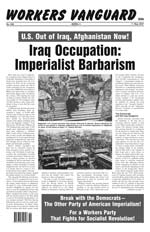
The Capitalist State and Proletarian Revolution (Quote of the Week) Echoing the notion that the state embodies the interests of society as a whole, a pillar of bourgeois ideology, the reformist left puts forward the proposition that the institutions of the capitalist state can be pressured into serving the interests of the working class and the oppressed. Combatting such illusions, the 1938 founding document of the then-Trotskyist Socialist Workers Party upheld the Marxist understanding that the emancipation of the proletariat requires a socialist revolution that smashes the capitalist state and replaces it with a workers state. In any society, the real power is held by those who own and control the means whereby that society lives, the instruments of production, distribution, and communication. In capitalist society, such ownership and control is held and exercised by the big bourgeoisie, by the bankers and industrialists. Through its hold on the major natural resources, the factories, mines, banks, railroads, ships, airplanes, telegraph, radio, and press, the big bourgeoisie effectively dominates capitalist society, runs society in such a manner as to secure and maintain its own interest and privilege, and upholds the system of the exploitation of the great majority. The state or government, far from representing the general interests of society as a whole, is in the last analysis simply the political instrument through which the owning class exercises and maintains its power, enforces the property relations which guarantee its privileges, and suppresses the working class. In these essential functions all of the organs and institutions of the state power cooperate—the bureaucracy, the courts, police, prisons, and the armed forces. The particular political forms of capitalist society (monarchy, democracy, military dictatorship, fascism) in no way affect the basic social dictatorship of the controlling minority, and are only the different means through which that dictatorship expresses itself. The belief that in such a country as the United States we live in a free, democratic society, in which fundamental economic change can be effected by persuasion, by education, by legal and purely parliamentary methods, is an illusion.... Since the capitalist state is the political instrument of capitalist dictatorship, and since the workers can carry out socialization only through the conquest and maintenance of political power, the workers must, as the necessary political phase of the change of ownership and control of the productive mechanism, take control of state power through the overthrow of the capitalist state and the transfer of sovereignty from it to their own workers’ state—the dictatorship of the proletariat. Opportunities for the workers to take power have come and will come in the course of the disintegration of material life and of culture under capitalist dictatorship. The masses find themselves faced with growing hunger, impoverishment, curtailment of social services, and the threat or actuality of fascism and war. When the profound social discontent generated by the crisis of capitalism extends to a decisive majority of the working class and of the productive sections of the population generally, and when these have been won to the perspective of revolutionary change, the workers will be in a position to take power and to put an end to the destructive course of capitalist dictatorship. —“Declaration of Principles” (1938),
|
|
||||||||||||||||||||||||||||||||||||||||||||||||||


